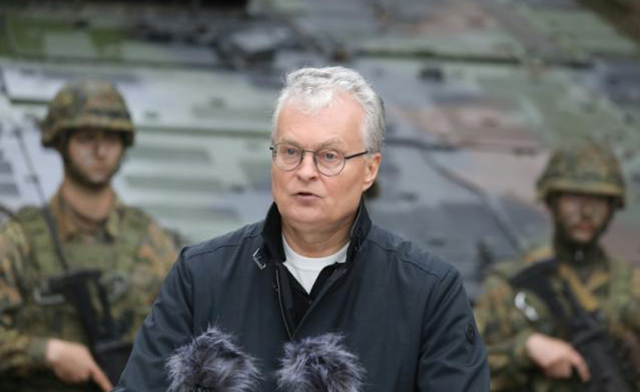
VILNIUS, May 9, 2024 (BSS/AFP) - Lithuania votes Sunday in a presidential election dominated by security concerns as the NATO and EU member plans to boost defence spending to counter the perceived threat from neighbouring Russia.
The Baltic state of 2.8 million people fears it could be next in Russia's crosshairs if Moscow wins its war against Ukraine, which began with an invasion in 2022.
"Lithuania's understanding of the Russian threat is unanimous and unquestionable, so the main candidates are following suit," Eastern Europe Studies Centre director Linas Kojala told AFP.
Opinion polls give the incumbent, 59-year-old former banker Gitanas Nauseda, a comfortable lead over the other seven candidates, who include Prime Minister Ingrida Simonyte and prominent lawyer Ignas Vegele.
The Lithuanian president steers defence and foreign policy, attending EU and NATO summits, but must consult with the government and parliament on appointing the most senior officials.
While the top three candidates agree on defence, they share diverging views on Lithuania's relations with China, which have been strained for years over Taiwan.
- Defence budget -
Lithuania, a former Soviet republic now in the European Union and NATO, is known as a top donor to Ukraine and a big defence spender, with a current budget of 2.75 percent of GDP.
The Simonyte-led government is expected to come forward with proposals within several weeks that could help increase defence spending to three percent.
Lithuania notably intends to use the funds to purchase tanks and additional air defence systems, and to host a German brigade, as Berlin plans to complete the stationing of around 5,000 troops by 2027.
None of the top candidates appear to question these plans, but Vegele has pledged to ask for a defence audit to effectively manage finances if he is elected.
- Run-off vote likely -
Observers believe Nauseda will be reelected in a run-off at the end of the month. He appears unlikely to garner enough votes -- over 50 percent -- to score an outright win.
Nauseda is projected to receive more than 35 percent of the vote in the first round, according to the latest opinion poll, which gives Vegele 12 percent and Simonyte 10.
Vegele, a 48-year-old lawyer who gained prominence after speaking out against mandated vaccination during the pandemic, presents himself as an alternative to established politicians and vows more transparent governance.
Simonyte, 49, is a fiscal conservative with liberal views on social issues. She notably supports same-sex partnerships, which still stir controversy in the predominantly Catholic country.
Simonyte is running for president for a second time after losing to Nauseda in the run-off of the 2019 election.
"Simonyte is supported by conservative party voters and liberal people, while Nauseda is a candidate of the left in terms of economic and social policy," Vilnius University analyst Ramunas Vilpisauskas told AFP.
Meanwhile, "Vegele will get support from those who simply want change", he added.
- Tension over Taiwan -
The uneasy relationship between Nauseda and his rival Simonyte's ruling conservatives has at times triggered foreign policy debates, most notably on Lithuania's relations with China.
Bilateral ties turned tense in 2021, when Vilnius allowed Taiwan to open a de facto embassy under the island's name in a departure from the common diplomatic practice of using the name of the capital Taipei to avoid angering Beijing.
China, which considers Taiwan a part of its territory and bristles at support for the island that might lend it any sense of international legitimacy, downgraded diplomatic relations with Vilnius and blocked its exports.
This sparked controversy among Lithuanian politicians, with some urging a restoration of relations for the sake of the Lithuanian economy.
"China's reaction to the opening of the office was harsher than predicted, and that sparked the debate," Kojala said, adding that China's response was hurting local businesses.
Nauseda said during the election campaign: "I would see the need to change the name of the representative office."
Simonyte pushes back against the name change, while Vegele backed Nauseda by telling the BNS news agency that "opening a representative office with this name was a reckless move".